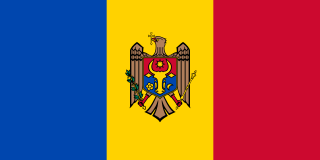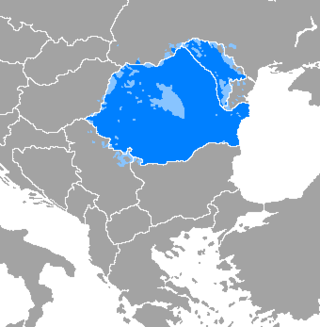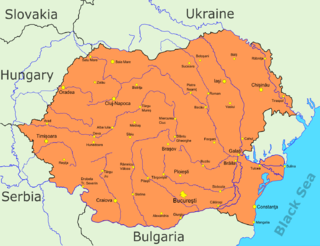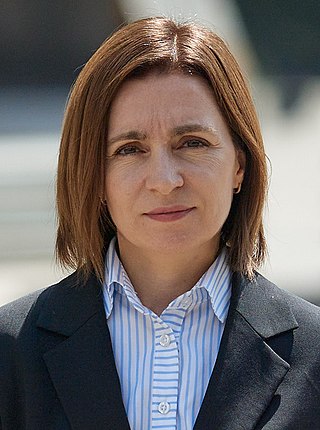
The politics of Moldova take place in a framework of a parliamentary representative democratic republic, wherein the prime minister is the head of the Government of Moldova, and a multi-party system. The President of Moldova has no important powers. The government exercises executive power while the legislative power is vested in the Parliament. The judiciary is independent of the executive and the legislature. The position of the breakaway region of Transnistria, relations with Romania and with Russia, and integration into the EU dominate political discussions.

Moldova, officially the Republic of Moldova, is a landlocked country in Eastern Europe, on the northeastern corner of the Balkans. The country spans a total of 33,483 km2 and has a population of approximately 2.5 million as of January 2023. Moldova is bordered by Romania to the west and Ukraine to the north, east, and south. The unrecognised breakaway state of Transnistria lies across the Dniester river on the country's eastern border with Ukraine. Moldova is a unitary parliamentary representative democratic republic with its capital in Chișinău, the country's largest city and main cultural and commercial centre.

Romanian is the official and main language of Romania and Moldova. As a minority language it is spoken by stable communities in the countries surrounding Romania, and by the large Romanian diaspora. In total, it is spoken by 28–29 million people as an L1+L2 language, of whom c. 24 million are native speakers. In Europe, Romanian occupies the 10th position among 37 official languages.

Chișinău, formerly known as Kishinev, is the capital and largest city of the Republic of Moldova. The city is Moldova's main industrial and commercial centre, and is located in the middle of the country, on the river Bîc, a tributary of the Dniester. According to the results of the 2014 census, the city proper had a population of 532,513, while the population of the Municipality of Chișinău was 700,000. Chișinău is the most economically prosperous locality in Moldova and its largest transportation hub. Nearly a third of Moldova's population lives in the metro area.
Moldovan, also known historically as Moldavian, is one of the two local names for the Romanian language in Moldova. Moldovan was declared the official language of Moldova in Article 13 of the constitution adopted in 1994, while the 1991 Declaration of Independence of Moldova used the name Romanian. In 2003, the Moldovan parliament adopted a law defining Moldovan and Romanian as glottonyms for the same language. In 2013, the Constitutional Court of Moldova interpreted that Article 13 of the constitution is superseded by the Declaration of Independence, thus giving official status to the name Romanian. The breakaway region of Transnistria continues to recognize Moldovan as one of its official languages, alongside Russian and Ukrainian. Ukraine also continues to make a distinction between Moldovan and Romanian, with one village declaring its language to be Romanian and another declaring it to be Moldovan, though Ukrainian officials have announced an intention to remove the legal status of Moldovan. On 16 March 2023, the Moldovan Parliament approved a law on referring to the national language as Romanian in all legislative texts and the constitution. On 22 March, the president of Moldova, Maia Sandu, promulgated the law.

Transnistria, officially the Pridnestrovian Moldavian Republic (PMR), is an unrecognised breakaway state that is internationally recognised as a part of Moldova. Transnistria controls most of the narrow strip of land between the Dniester river and the Moldovan–Ukrainian border, as well as some land on the other side of the river's bank. Its capital and largest city is Tiraspol. Transnistria has been recognised only by three other unrecognised or partially recognised breakaway states: Abkhazia, Artsakh and South Ossetia. Transnistria is officially designated by the Republic of Moldova as the Administrative-Territorial Units of the Left Bank of the Dniester or as Stînga Nistrului. In March 2022, the Parliamentary Assembly of the Council of Europe adopted a resolution that defines the territory as under military occupation by Russia.

Gagauzia or Gagauz-Yeri, officially the Autonomous Territorial Unit of Gagauzia (ATUG), is an autonomous territorial unit of Moldova. Its autonomy is ethnically motivated by the predominance in the region of the Gagauz people, who are primarily Orthodox Turkic-speaking people.

According to the Moldovan law on territorial administrative organisation, Moldova is divided administratively into the following administrative territorial units: districts, cities/towns and villages. The administrative territorial organization of Moldova is made on 2 levels:
- villages (communes), sectors and cities/towns (municipii) constitute the first level,
Fotbal Club Sheriff Tiraspol, commonly known as Sheriff Tiraspol or simply Sheriff, is a professional football club based in Tiraspol, a city located in the unrecognised breakaway state of Transnistria, that plays in the Moldovan Super Liga. Founded in 1997 as Tiras Tiraspol and rebranded the following year as Sheriff, it quickly established itself within Moldovan football.

The Moldova national football team represents Moldova in international football and is controlled by the Moldovan Football Federation, the governing body for football in Moldova. Moldova's home ground is Zimbru Stadium in Chișinău and their head coach is Serghei Cleșcenco. Shortly before the break-up of the Soviet Union, they played their first match against Georgia on 2 July 1991.

The president of the Republic of Moldova is the head of state of Moldova. The current president is Maia Sandu, who assumed office on 24 December 2020.

The Moldovan Football Federation is the governing body of football in Moldova. It organizes all the football leagues, including the top-tier league Moldovan Super Liga, and the Moldova national football team. It is based in Chișinău. The current president is Leonid Oleinicenco.

The Transnistria War was an armed conflict that broke out on 2 November 1990 in Dubăsari between pro-Transnistria forces, including the Transnistrian Republican Guard, militia and neo-Cossack units, and pro-Moldovan forces, including Moldovan troops and police.

Moldovans, sometimes referred to as Moldavians, are a Romanian-speaking ethnic group and the largest ethnic group of the Republic of Moldova and a significant minority in Ukraine and Russia. There is an ongoing controversy, in part involving the linguisitic definition of ethnicity, over whether Moldovans' self-identification constitutes an ethnic group distinct and separate from Romanians, or a subset. The extent of self-identification as Romanians in the Republic of Moldova varies.

The unification of Moldova and Romania is a popular concept in the two countries that began during the Revolutions of 1989. The Romanian Revolution in 1989 and the independence of Moldova in 1991 further contributed to the development of a movement for the unification of the two Romanian-speaking countries. The question of reunification is recurrent in the public sphere of the two countries, often as a speculation, both as a goal and a danger. Though historically Romanian support for unification was high, a 2022 survey during the Russian invasion of Ukraine indicated that only 11% of Romania's population supports an immediate union, while over 42% think it is not the moment.

Fotbal Club Zimbru Chișinău, commonly known as Zimbru Chișinău or simply Zimbru, is a Moldovan professional football club based in Chișinău, which competes in the Moldovan Super Liga, the highest tier of Moldovan football.

Fotbal Club Bălți is a Moldovan professional football club based in Bălți, founded in 1984 as FC Zaria Bălți and refounded in 2020 as FC Bălți. They play in the Super Liga, the top division of Moldovan football. Between 1992 and 2014, the team was known as FC Olimpia Bălți.

Maia Sandu is a Moldovan politician who has been the President of Moldova since 24 December 2020. She is the founder and former leader of the Party of Action and Solidarity (PAS) and former Prime Minister of Moldova from 8 June 2019 until 14 November 2019, when the government collapsed after a vote of no-confidence. Sandu was Minister of Education from 2012 to 2015 and member of the Parliament of Moldova from 2014 to 2015, and again in 2019.
During the COVID-19 pandemic, Romania has supported Moldova on several occasions, supplying it with medical equipment and supplies, volunteer Romanian experts and doctors and even a series of COVID-19 vaccine units that arrived on 27 February 2021, which allowed Moldova to start its vaccination program.

COVID-19 vaccination in Moldova started on 2 March 2021. During the COVID-19 pandemic, Moldova was very reliant on external help from other countries, having received donations of vaccines from Romania, the United Arab Emirates, Russia and China. In fact, Moldova's vaccination campaign started due to a donation from Romania on 27 February 2021 composed of 21,600 Oxford–AstraZeneca COVID-19 vaccine doses, with the first vaccinated person in the country being Alexandru Botizatu. Romania had promised earlier, on 29 December 2020, that it would help Moldova with a collaboration project which would include 200,000 vaccine doses to help Moldova combat the pandemic, but also other matters of the country. Romania subsequently made more donations on 27 March 2021 with 50,400 vaccine units; on 17 April 2021 with 132,000 vaccine doses, fulfilling its promise to Moldova; and on 7 May 2021 with 100,800 vaccine units even though this surpassed the promised 200,000 vaccine doses.
















